Everything You Need to Know About Nanoblading for Fuller-Looking Brows

getty images
They say that eyebrows are sisters, not twins, but after trying ever-so-hard to make them match up, day in and day out, the asymmetrical end result can feel nothing short of annoying. That’s why eyebrow tattoos exist. By opting for a permanently etched arch, you rid yourself of the woes of daily brow application.
Meet Our Expert
Zeta is a cosmetic tattoo artist at Bonita Cosmetic Tattoo Studio in New York City.
James Kilgour, MD, is a Stanford University resident dermatologist and the founder of KilgourMD.
Before you make a beeline for microbladed brows, though, make sure to brush up on nanoblading to see if the lesser-known cosmetic brow tattoo might be a better fit for you.
How Nanoblading Works
According to cosmetic tattoo artist Zeta, nanoblading is a cosmetic tattoo procedure in which ultra-fine, natural-looking lines are inked on to mimic the appearance of brow hairs. What sets nanoblading apart is the device used to create the hair-like strokes. Instead of having various needles poking and prodding the skin, nanoblading uses just one.
“Nanoblading is a cosmetic tattoo procedure [used to] replicate the look of real eyebrow hairs, to fill in sparse areas, and create a natural full brow shape,” Zeta says.
Benefits of Nanoblading
Hands down: Nanoblading creates the most natural-looking tattooed brows. “Because a single needle is used, nanoblading allows the artist more freedom in creating perfectly imperfect restored brow shapes that have long-lasting results and will save you time on your daily makeup routine,” Zeta says. And thanks to the precision of nanoblading, the technique is also ideal for fixing and/or covering up other brow tattoos.
Nanoblading vs. Microblading
Nanoblading and microblading differ in how they implant the ink into the skin, and the end results they’re able to achieve based on such.
“Both nanoblading and microblading give ultra-natural, realistic-looking results and they both fade over time, but it’s all about choosing the best one for your client’s skin type,” Zeta says. “Nano brows are hairstrokes done with a tattoo machine and a single needle to create a soft, pixelated hair strokes. The machine allows for more artistic freedom and versatility to create intricate brow patterns.” Nano brows are great for all skin types. However, Zeta says that they’re most ideal for those for whom microblading isn't as suitable, like those with oily, porous, textured, sensitive, or mature skin.
Then there’s microblading. “Microblading is done with a manual tool (microblade) creating tiny cuts in the skin where the ink is implanted into,” Zeta shares. It’s ideal for normal, dry, and combination skin types.
What to Know Beforehand
As with many cosmetic and tattoo procedures, Zeta says that you should avoid heavy sun exposure, sweating, caffeine, and alcohol leading up to your appointment. “Make sure to get a good night's sleep and eat something before coming in,” she adds.
Stanford University resident dermatologist James Kilgour, MD, founder of KilgourMD, says to clear your brow area prior to treatment, too. “Before the appointment, make sure to clean the area with your usual cleanser and avoid applying any skincare or makeup products, as there have been rare reports of foreign body reactions to topical cosmetics that have entered the deeper layers of the skin, as a result of procedures such as microneedling and microblading,” he explains. “Your proceduralist should also repeat this skin preparation immediately before the procedure with alcohol or another suitable antibacterial skin cleanser to reduce the risk of infection.”
The Step-by-Step Process
Nanoblading is like just about any other tattoo. “Nanoblading is applied using an extremely small needle (hence, the nano in the name),” Kilgour says. The appointments typically take a few hours, Zeta says. “The first hour is spent mapping your eyebrows—designing a shape for your brows based on your facial bone structure,” she reveals. “We will then choose a pigment color that complements your skin tone and matches your natural hair color. From there, we will get the client numb and ready to begin the procedure.”
Once the nanoblading process is complete, the brow artist will clean your brows and examine them for symmetry. They will also list out aftercare instructions for optimal healing. “From there, you will need to come back for a touch-up in order to ensure everything has healed smoothly,” Zeta adds.
5 Nanoblading Before and Afters
Nanoblading to Add Volume and Definition
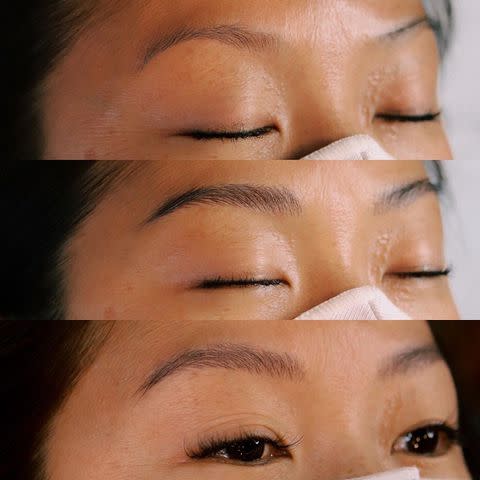
Instagram: @shaughnessy
Nanoblading to Add Lots of Density
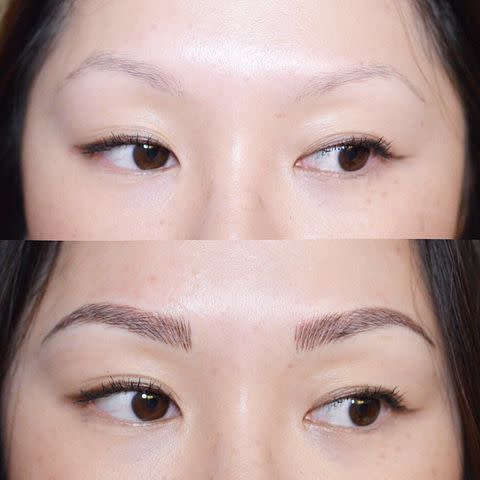
Instagram: @shaughnessy
Nanoblading to Add a Bit of Fullness
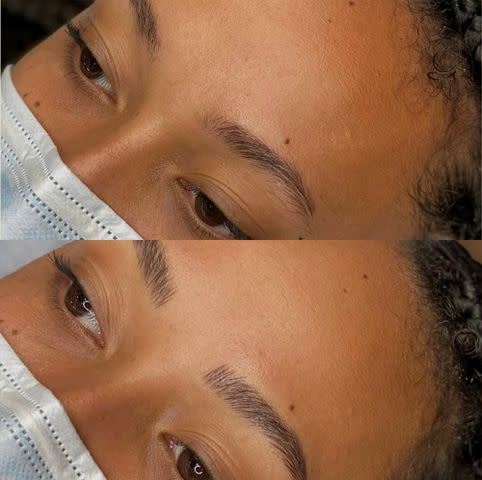
Instagram: @studiosashiko
Nanoblading to Darken and Reshape
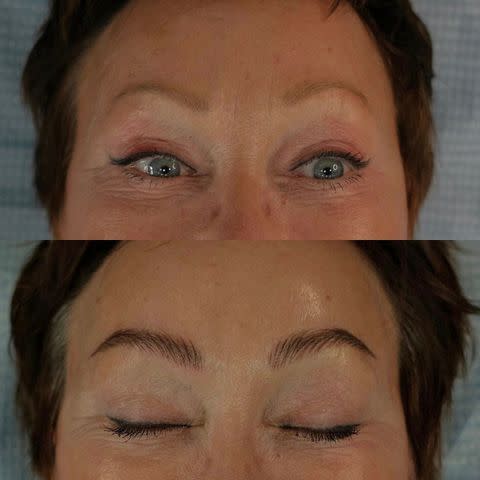
Instagram: @studiosashiko
Nanoblading to Add Definition
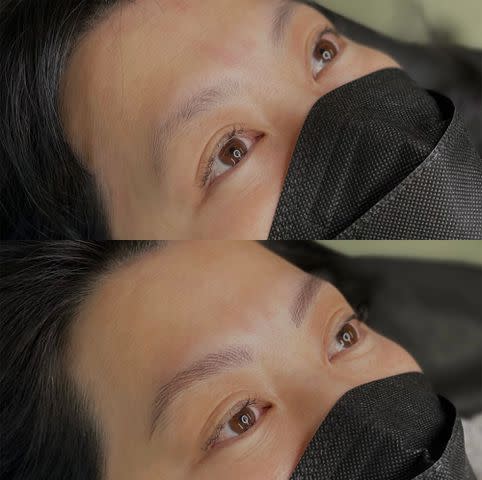
Instagram: @studiosashiko
Aftercare and Upkeep
Following your nanoblading appointment, you’ll want to keep your brows adequately hydrated, just as you would a regular tattoo. “Afterwards, liberally apply Vaseline or Aquaphor, which will act as a barrier while the skin heals (from the microtrauma of the nanoblading) and help to prevent infection,” Kilgour instructs. “[Also,] wait a few days before applying your usual skincare actives to the area to allow full healing.”
That said, Zeta says you want to cleanse your brows twice daily, morning and night. She says to use warm water with a tiny drop of mild cleanser to avoid any adverse reactions.
“Just like a body tattoo, you need to avoid exercising and sweating for the first week,” she adds. “No swimming pools, saunas, jacuzzis, or the ocean for two weeks, and avoid sun exposure for at least three to four weeks. Once healed, you may apply sunscreen on the treated area.”
How Long Nanoblading Lasts
While nanoblading is a type of tattoo, the results aren’t quite as permanent. “How the brows heal and how fast they’ll fade is unique to each individual and depends on many factors, primarily skin type, lifestyle, aftercare, and the level of artistry of the cosmetic tattooer,” Zeta says. “It’s recommended to do a refresher every two years with both techniques to keep the brows looking fresh.”
Side Effects and Risks
Like any tattoo or cosmetic procedure, there are nanoblading risks to be aware of. “Infection of the skin and blood-borne infections are possible with nanoblading,” Kilgour says. “To mitigate this, ensure you see a licensed proceduralist with appropriate training and experience.” He also reiterates the importance of arriving at your appointment with freshly cleansed skin and ensuring that your tattooer further sanitizes the treatment area.
While unlikely, Kilgour points out that it’s also possible to have an allergic reaction to the pigment used in nanoblading treatments. “This typically results in a delayed reaction (48 to 72 hours) with a blistering, red, itchy rash at the site of the procedure,” he reveals. “This is uncommon, but can be hard to predict—if you’ve ever had a reaction to a tattoo or a dye in the past, you should absolutely consult with a dermatologist before proceeding to consider a patch test.”
Overall, Zeta says that people who are pregnant, diabetic, on blood thinners or Accutane, who have just received Botox or a cosmetic peel, or who have serious diseases such as cancer, epilepsy, or auto-immune disorders should avoid nanoblading and brow tattoos as a whole.
If you’re set on getting nanobladed brows, talking to a dermatologist can help determine if the technique is a good (and safe) option for you.
Frequently Asked Questions
Does nanoblading hurt?
That’s subjective. However, Zeta says that most clients don’t report experiencing pain during nanoblading treatments. “Two anesthetics are used to keep the client comfortable,” she says. “One numbing cream is used prior to the service starting, and a second numbing agent is applied during the service.”
Does nanoblading or microblading last longer?
It’s a close call. “It has been shown that nanoblading, when properly executed and healed, can last slightly longer than microblading,” Zeta says. “It’s always good to do your homework prior to booking your appointment and make sure you like the style of the cosmetic tattooer you decide to go to.”
How much does it cost?
It’s entirely dependent on where you go and the level of expertise your tattooer has. Generally speaking, nanoblading costs more in major cities. “A typical price range for this kind of service is between $700 to $1200,” Zeta says.
For more InStyle news, make sure to sign up for our newsletter!
Read the original article on InStyle.


